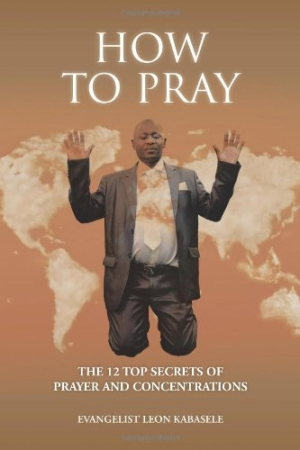How to Pray
The 12 Top Secrets of Prayer and Concentrations
Evangelist makes a case for concentration in prayer as a key to accessing the power of God.
How to Pray, by evangelist Leon Kabasele, is a Bible-based look at why a person should pray, how to pray effectively, and ways to pray. Kabasele was born in the Democratic Republic of Congo and has lived, miraculously, through a near-death illness. His experience and voice are enough to pique curiosity about how his unique life and perspective shine through on the fairly universal topic of prayer.
Kabasele presents readers with an interesting notion: concentration is vital to prayer. Even for Christians who pray regularly, this is a less-talked-about area within the conversation on prayer: “Concentration is a way of focusing all your intentions. I think that when somebody concentrates in prayer, this means that mind, soul, spirit, and body are coming together.” Kabasele contends that this unity helps access the power of God. The author uses Bible passages to back up his statements throughout the book.
The book is not quite as instructional as the title promises; the content comes off more as Kabasele’s thoughts on the topics of each chapter and lacks a critical how-to element. This is especially true in portions that promise a practical breakdown of topics such as “the different types of prayers,” which instead turns out to be Kabasele’s thoughts on prayers from the Bible and crucial times of prayer in his own life.
The subtitle (The 12 Top Secrets of Prayer and Concentrations) doesn’t give readers an accurate picture of the book’s content. There are, in fact, only eleven chapters, and while they do deal exclusively with prayer and concentration, they read more as explorations or discussions than as the gimmicky “secrets” implied.
Poorly constructed sentences, errors, and overexplanation slow the work down and pull readers away from the heart of the text. For example, chapter six begins, “Through my ministry studied, I have been studying Greek and Hebrew language, this is why I am going to introduce some the interpretation from praise and worship.”
Most Christians will not object to Kabasele’s teachings on prayer, and they will find that his words serve as good reminders and encouragement. But many Christian readers will be taken aback by Kabasele’s references outside of Christianity, such as, “Jesus Christ himself prayed about us, and what if the prophet Muhammad prayed about you?” Those who stick with the text, however, will see that these kinds of statements are infrequent, show Kabasele’s boldness, and don’t reflect a lack of biblical grounding. For the interested reader, the author’s earnestness helps overcome some of the book’s flaws.
Reviewed by
Melissa Wuske
Disclosure: This article is not an endorsement, but a review. The publisher of this book provided free copies of the book and paid a small fee to have their book reviewed by a professional reviewer. Foreword Reviews and Clarion Reviews make no guarantee that the publisher will receive a positive review. Foreword Magazine, Inc. is disclosing this in accordance with the Federal Trade Commission’s 16 CFR, Part 255.

